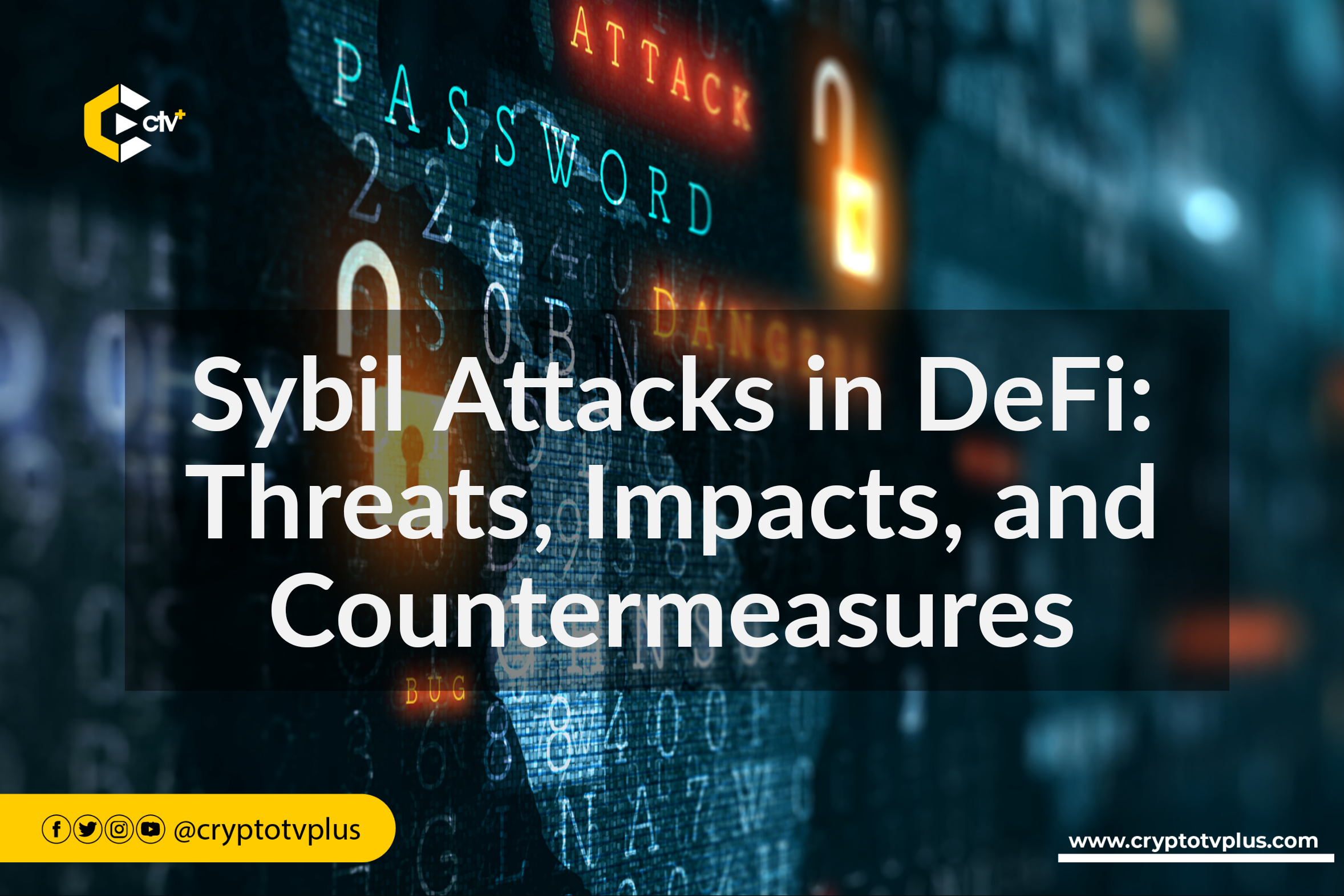Education
Sybil Attacks in DeFi: Threats, Impacts, and Countermeasures

Sybil attacks pose a significant threat to the integrity and security of decentralized systems, particularly in the realm of decentralized finance (DeFi). In this article, we delve into the history of Sybil attacks, explore their impact on DeFi systems, and discuss existing solutions and strategies to mitigate these attacks.
Understanding Sybil Attacks
Coined in 2002, the term “Sybil” references the book “Sybil” by Flora Rheta Schreiber, which portrays a case of multiple personality disorder. In the context of decentralized systems, a Sybil attack involves the creation and control of multiple fake identities or nodes by a single malicious entity. These identities are designed to appear legitimate, deceiving the system and compromising the trust among network participants.
Sybil attacks aim to undermine trust mechanisms and reputation systems that are vital for the proper functioning of decentralized systems. By creating numerous Sybil identities, attackers can manipulate decision-making processes, gain unfair advantages, and launch additional attacks within the system. In DeFi, Sybil attacks can influence voting mechanisms, compromise reputation-based systems, disrupt liquidity pools, manipulate trading activities, and cause financial losses.
Impacts on DeFi Systems
The impact of Sybil attacks on DeFi systems is profound and far-reaching. One of the primary consequences is the manipulation of voting mechanisms and governance protocols. DeFi platforms often incorporate decentralized governance models, where token holders participate in decision-making processes. Sybil attackers create fake identities and acquire a significant number of tokens to sway voting outcomes, undermining the democratic nature of DeFi systems.
Moreover, Sybil attacks compromise the accuracy and reliability of reputation-based systems within DeFi platforms.
Reputation plays an important role in assessing the trustworthiness of participants and determining access to financial services. Through the creation of multiple fake identities, attackers can inflate their reputation scores, distorting resource allocation based on merit.
Sybil attacks also disrupt liquidity pools and trading activities. Attackers inject illiquid or worthless assets into pools, manipulating market prices and causing financial losses for legitimate users. Furthermore, these attacks can be leveraged to manipulate the order book, execute front-running attacks, and engage in other forms of market manipulation, leading to unfair trading practices and financial instability. Users may suffer financial losses, leading to decreasing interest and overall trust in the DeFi ecosystem. This ultimately translates to slow growth/stagnation and adoption of DeFi platforms.
Examples of Sybil attacks in the Crypto Industry and their impacts
Arbitrum (ARB) airdrop, March 23, 2023.
How it was done: The attackers used a variety of methods to create fake wallets, including using disposable email addresses.
Impact: The attack resulted in several hundred thousand dollars worth of ARB tokens being claimed by fake accounts. These individuals then proceed to sell all at once, which then affects prices drastically.
Optimism (OP) airdrop, May 31, 2022.
How it was done: The attackers used a variety of methods, including using social media bots to create fake wallets and discord accounts and using rented servers to generate large numbers of IP addresses.
Impact: The attack resulted in over 500,000 OP tokens being claimed by Sybil attackers
Existing Solutions and Countermeasures
To combat Sybil attacks in DeFi systems, various solutions, and countermeasures have been proposed. One prevalent approach is the utilization of centralized reputation systems. However, these systems rely on trusted authorities, introducing other vulnerabilities and it is against decentralization principles.
1. Centralized Reputation Systems
One prevalent approach to combat Sybil attacks is the utilization of centralized reputation systems. These systems assign reputation scores to participants based on their behaviour and interactions within the ecosystem. Participants with higher reputation scores are granted certain privileges or benefits within the platform. However, centralized reputation systems rely on trusted authorities or centralized entities to manage and assign reputation scores, which introduces vulnerabilities and undermines the core principles of decentralization.
Furthermore, centralized reputation systems suffer from single points of failure. Malicious actors can target these centralized entities, compromising the reputation scores and distorting the trustworthiness assessment of participants. The reliance on trusted authorities contradicts the decentralized nature of DeFi and introduces a critical dependency on central entities that can be compromised or manipulated.
2. Know Your Customer (KYC)
KYC, or Know Your Customer, is the most common method of identity verification. It is a regulatory requirement in many countries that necessitates financial institutions and other regulated entities to confirm the identity of their customers.
Many decentralized identity solutions require users to undergo KYC and provide sensitive personal information like government ID, address, photo, etc. However, these solutions pose security and privacy risks as users’ personal information is stored in centralized servers with potential access by appointed employees, making it susceptible to manipulation, loss, or theft.
To achieve minimal resistance to Sybil attacks, this approach utilizes identity proxies such as phone numbers, credit cards, or IP address verification. However, techniques like SMS or IP address spoofing can be employed to obtain numerous identity proxies easily.
KYC processes can also be expensive and time-consuming. Customers must go through a series of steps to complete the verification process, which can still be inaccurate due to software, human error, or fraudulent documents. Additionally, KYC exclusion can limit access to financial services for certain populations without the necessary documents, such as refugees or those without a permanent address.
3. Proof of Work (PoW)
Proof of Work (PoW) is a consensus mechanism used in blockchain networks to achieve Sybil resistance. It requires participants, known as miners, to compete to solve complex mathematical puzzles, requiring significant computational power and energy consumption.
The idea behind PoW as a Sybil resistance mechanism is that it is computationally expensive and time-consuming to solve these puzzles. This makes it impractical and costly for an attacker to generate multiple identities and control a significant portion of the network. The security of PoW lies in the fact that the majority of the network’s computational power is held by honest participants who follow the consensus rules.
While PoW offers decentralized consensus and has proven to be highly secure, it comes with limitations. The high energy consumption associated with PoW raises environmental concerns. Additionally, PoW can result in longer transaction confirmation times and higher fees due to the computational effort required for block validation.
4. Proof of Stake (PoS)
Another approach to mitigate Sybil attacks in DeFi is the adoption of Proof of Stake (PoS) mechanisms. PoS mechanisms require participants to stake a certain amount of tokens to gain voting power or influence within the ecosystem. The idea behind PoS is that participants who hold a significant stake in the network have a vested interest in its security and integrity, discouraging them from engaging in malicious activities.
While PoS mechanisms have shown promise in deterring Sybil attacks, they are not foolproof. Determined attackers can still invest significant resources to create a large number of fake identities, diluting the influence of genuine participants and compromising the accuracy of decision-making processes. Moreover, PoS mechanisms rely on the assumption that participants’ economic incentives align with the security and integrity of the system, which may not always hold.
5. Proof of Burn (PoB)
In PoB, participants are required to “burn” or destroy a certain amount of cryptocurrency to gain access or influence within the system.
The concept behind PoB is that by burning cryptocurrency, participants demonstrate a tangible cost or sacrifice, making it economically prohibitive to create multiple fake identities or Sybil nodes. Someone willing to burn a significant amount of value is considered to have a genuine interest in the system’s integrity and is less likely to engage in malicious activities.
While PoB can be an effective Sybil resistance mechanism, it has its limitations. Determining the appropriate amount of cryptocurrency to burn and establishing criteria for access or influence within the system can be challenging. Additionally, the burned tokens are permanently removed from circulation, which may have implications for the token’s liquidity and overall ecosystem.
6. Web of Trust (WoT)
The Web of Trust (WoT) is a trust model that can be used to establish the authenticity and reputation of individuals or entities within a network. It is based on the concept of individuals vouching for the trustworthiness of others.
In a WoT model, each user has a trust rating that is determined by the ratings of other users they are connected to. The more trustworthy the user’s connections, the more trustworthy the user is perceived to be. This creates a decentralized system of trust that does not rely on centralized authorities or institutions.
While the WoT model offers greater privacy and security, it also has limitations. Establishing trustworthiness can be subjective, and the model relies on the reputation and trustworthiness of individuals, which can be challenging to establish. The WoT model may also be vulnerable to attacks by malicious actors attempting to manipulate trust relationships.
Emerging approaches include social trust graphs, reverse Turing tests and application-specific defenses. These leverage connectivity patterns, cryptographic techniques, and trust-based models to prevent and detect Sybil attacks.
Closing thoughts
Sybil attacks pose significant threats to the security, integrity, and trustworthiness of DeFi systems. Through the incorporation of and building innovative solutions, we can strengthen the resilience and trustworthiness of DeFi platforms, ensuring their sustainability and continued growth. This will help preserve the integrity of the decentralized finance landscape.
Read also: Enhancing blockchain security with Threshold Signature Scheme
























